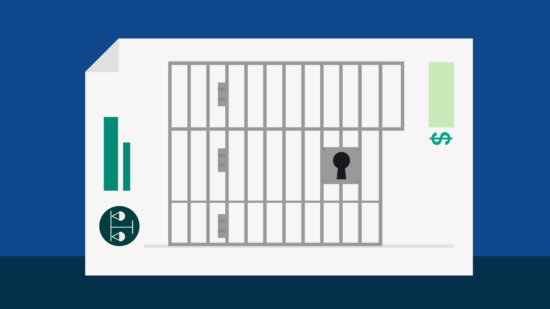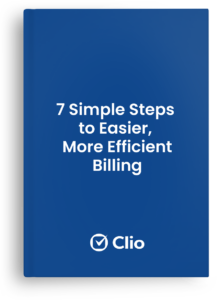Invoice management for criminal defense lawyers comes with its own set of challenges. When you’re deep in fast-moving, emotionally intense cases and high-stakes client work, keeping up with billing and payment tracking can quickly become overwhelming.
And because many defense firms rely on flat-fee billing, it’s easy for invoices to fall through the cracks—especially when clients are under pressure and administrative follow-ups feel secondary. Managing legal billing can feel like just another task you don’t have time to handle, whether it’s chasing payments, handling fee misunderstandings, or following up on overdue invoices.
In this post, we’ll explore common billing challenges for criminal defense lawyers and share practical tips to help you get paid faster—plus how invoicing software can simplify the process.
Want to make the payment collection process fast, automated, and convenient for you and your clients? Learn more about Clio Payments—our built-in online and in-person payment processing solution.
The importance of invoice management for criminal defense attorneys
Effective invoice management—accurately tracking time, billing, and collecting payment for your legal services—is essential to running a successful law firm. Yet, for criminal defense attorneys who work in a high-stakes, fast-moving environment with clients facing intense emotional and legal challenges, managing invoicing can be especially difficult.
But strong invoice management for criminal defense lawyers isn’t just about keeping your practice afloat. It’s also about building client trust, avoiding future billing disputes, and setting your firm up for long-term financial strength. When your cash flow is steady, you can stay focused where it matters most, giving the best possible representation to your clients.
Having proper systems in place, including legal billing software, is essential. Here are three key ways optimizing your invoicing processes can make a big difference for criminal defense lawyers:
1. Customizable invoice templates for consistent criminal defense billing
While every case is unique, many criminal defense matters follow familiar billing structures, such as flat fees for arraignments or hourly rates for trial prep.
Using customizable invoice templates tailored to your practice helps streamline billing, reduce your administrative workload, and ensure clients receive clear, consistent invoices.
2. Automated billing and reminders for enhanced cash flow
According to the latest Legal Trends for Solo and Small Law Firms report, firms are missing out on invoicing 14% of billable hours to clients—indicating a significant source of lost revenue.
Automation can help close that gap. Automated billing tools like those found in Clio Manage simplify time tracking so you capture every billable moment. Clio Payments helps automate the invoice creation process and lets you schedule automated payment reminders, ensuring follow-ups happen—even when you’re tied up in court or meeting with clients.
By reducing manual tasks related to billing and invoicing, automation can help criminal defense lawyers at small and solo firms improve cash flow with less effort.
3. Secure payment processing options for client convenience
The concept is straightforward: the easier you make it for clients to pay, the more likely you are to get paid quickly. According to the same Legal Trends for Solo and Small Law Firms report, solo and small firms get paid more than twice as fast when using online payments.
Offering flexible and secure payment options—such as credit cards, ACH payments, or payment plans—can be especially practical for criminal defense clients who may face financial strain or even limited access to traditional banking.
Put simply, providing convenient and secure payment options improves client experience, reduces friction, and can help you get paid faster.
Want to strengthen your criminal defense firm’s online presence? Explore our guide to effective criminal defense attorney website design.
Top invoicing challenges for solo criminal defense lawyers—and how to solve them

Now that we’ve established the importance of effective invoice management for solo and small criminal defense law firms, let’s explore some of the top invoicing challenges you may encounter—such as complex case dynamics, regulatory hurdles, and inefficient manual processes—and practical ways to solve them with the right tools and strategies.
The challenge: Complex transaction dynamics that complicate billing
Criminal law cases rarely follow a simple, straightforward billing structure. Factors like plea negotiations, pretrial motions, sentencing agreements, or coordinating with multiple co-defendants can all impact the scope and timing of your legal work. This can make it difficult to estimate and communicate fees clearly.
The fix:
Use customizable billing models that reflect the complexity of your cases and allow for flexible and transparent billing. For example, you might offer flat fees for predictable services like arraignments and hourly billing for more variable work like trial prep or court appearances. Legal billing software can make setting up and transparently managing these mixed billing structures easier.
The challenge: Regulatory and compliance hurdles
Some types of criminal defense work—such as court-appointed or public defender cases—require strict adherence to legal billing standards, reporting requirements, and compliance rules. Examples of these types of considerations include submitting detailed time logs, meeting invoice deadlines, and aligning with program-specific billing requirements.
The fix:
Choose legal billing tools that support compliance with court or funding agency billing guidelines and help you stay organized with detailed documentation. Legal practice management platforms like Clio Manage help streamline invoice creation, maintain accurate timekeeping, and organize case documentation—so you’re better prepared if a court or a funding agency requests records or an audit.
Get paid faster, save time, and reduce outstanding bills
Download our free e-book and learn the 7 easy steps to easier, more efficent billing
Get the e-bookThe challenge: Manual processes and inefficiencies that squander time and resources
While paper-based or spreadsheet billing might seem manageable for solo or small firms, manual systems often lead to errors, missed time, and delayed payments—hurting your cash flow and wasting valuable time.
The fix:
Digital billing and invoicing solutions eliminate many of these risks while reducing administrative burdens. With Clio Manage, for example, you can automatically track billable hours, generate professional invoices, and send automated reminders to help ensure faster, more consistent billing and collections.
The challenge: The fast-paced nature of criminal defense and the need to work on the go
Criminal defense lawyers often work unpredictable hours, move quickly between courtrooms, and meet clients in jails or other off-site locations. This pace leaves little time for administrative tasks like reviewing invoices or sending payment reminders—especially when you’re away from your desk.
The fix:
Use cloud-based legal billing software that lets you access case files, review bills, and manage payments from any device. With tools like Clio Manage and Clio Payments, you can stay on top of your billing while on the move, whether you’re in court, commuting, or meeting with clients, ensuring nothing falls through the cracks.
What tools help streamline invoicing for criminal defense firms?
Criminal defense firms can streamline invoicing with legal billing software and online payment processing tools. These tools offer features like automated time tracking, customizable invoice templates, and scheduled payment reminders to reduce manual work and free up more time for client work.
You may like these posts
Best invoicing software for a growing law firm: Clio Payments

Criminal defense firms have unique needs and challenges when it comes to billing and invoicing. For example, take something as simple and common as getting paid for criminal defense work via a paper check. Compared to eCheck payments or online card payments using software like Clio Payments, accepting a paper check slows down processes, lacks security, and creates more work reconciling payment for the law firm.
Ultimately, the best legal billing software for small law firms and solo lawyers shares a few essential qualities: it should be reliable, simplify your workflow, improve cash flow, and offer a seamless billing experience for both you and your clients.
Clio Manage’s legal billing software and built-in payment solution, Clio Payments, were made for this—giving you the tools to efficiently and effectively manage invoicing and payments so you can get paid faster while giving your clients a more convenient and flexible billing experience. Whether you’re managing flat-fee cases, hourly billing, or a combination of both as part of your criminal defense work, Clio helps you send professional invoices and get paid faster—with less administrative overhead.
Some of Clio Payments’ top features for legal invoice management allow you to:
- Deliver bills securely to clients via email or secure client portal. Send clients invoices quickly through email or Clio’s secure client portal, which allows clients to easily access their invoices whenever they need to.
- Set up automated payment plans for clients. Automated payment plans can help reduce the stress of large bills for clients by breaking payments into more manageable amounts and a schedule that fits their needs and your firm’s cash flow. This can also be useful for complex and ongoing legal work for criminal defense lawyers.
- Set up bill reminders. Automated bill reminders and calendar reminders take the hassle out of following up so you can get paid faster, with less manual effort.
- Bill against retainer. With Clio Payments, you can store payment methods so you can automatically apply charges against stored retainer funds.
- Offer tap-to-pay. Whether streamlining intake to retain a new client or making it easier for clients to pay invoices in person, Clio’s mobile app featuring built-in tap-to-pay (or accepting payments via QR code) helps ensure you get paid quickly and securely. This can be especially useful for criminal defense lawyers who need fast and easy intake so they can move forward on a new client’s case without delay.
- Split bills among multiple parties. When you need to divide charges among numerous parties, such as in a case with multiple co-defendants, Clio’s legal time and billing software allows you to split bills easily.
Note: Clio’s intuitive accounting software, Clio Accounting, can also help streamline your firm’s billing, payments, and accounting tasks in one connected system. It helps your firm stay compliant with trust accounting rules while making financial management easier and more efficient. Learn more about Clio Accounting.
Subscribe to the blog
The key to better invoice management for criminal defense lawyers
Criminal defense work is often unpredictable, emotionally intense, and fast-paced—but your invoicing doesn’t have to be.
With the right invoicing software tool, criminal defense firms can automate tedious processes, simplify invoicing, and make it easier to bill clearly and consistently. Clio Payments provides everything you need to manage your invoicing and payments efficiently, so you can focus on what matters most: giving the best possible representation to your clients.
Make it easy for your clients to pay their bills—and for your firm to get paid faster. See how Clio Payments can transform your billing and book a demo today!
Book a Clio demoAre flat fees an option for criminal defense billing?
Flat fees are commonly used in criminal defense billing for certain types of predictable tasks and services such as arraignments and pleas.
5 features to look for in legal billing tools for defense attorneys
Five features to look for in legal billing tools for defense attorneys include customizable invoice templates, automated payment reminders, secure payment options, time tracking integration, and the ability to share bills through a secure client portal.
What’s the best way to handle billing for court-appointed cases?
For court-appointed cases, consider a billing tool that complies with local regulations, supports detailed time tracking, and simplifies reporting and invoicing to meet the requirements of the specific court or funding agency.
We published this blog post in May 2025. Last updated: .
Posted in: Business, Technology
Get paid faster, save time, and reduce outstanding bills
Download our free e-book and learn the 7 easy steps to easier, more efficent billing
Get the e-book







